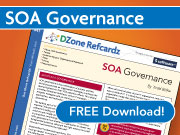 Mentoring and Followup to Clarity of Purpose
Mentoring and Followup to Clarity of Purpose
James McGovern posted his own thoughts in response to my Clarity of Purpose post. In it, he asks a couple of questions of me.
“I wonder if Todd has observed that trust as a concept is fast declining.” I don’t know that I’d say it is declining, but I would definitely say that it is a key differentiator between well-functioning organizations and poorly functioning organizations. I think it’s natural that as an organization grows, you have to work harder to keep the trust in place. How many people in a small town say they trust their local government versus a big city, let alone the country? The same holds true for typical corporate IT. As James’ points out, trust gets eroded easily when things are over-promised and under-delivered. Specifically in the domain of enterprise architecture, we’re at particular risk because we often play the role of the salesperson, but the implementation is left to someone else. When things go bad, the customer directs their venom at the salesperson, rather than digging deep to understand root cause. We also too frequently look to point fingers rather than fix the problem. It’s unfortunate that too many organizations have a “heads must roll” approach which doesn’t allow people to make mistakes and learn. A single mistake is a learning opportunity. Making the same mistake over and over is a problem that must be dealt with.
“Maybe Todd can talk about his ideas around the importance of mentoring in a future blog entry as this is where EA collectively is weak and declining.” Personally, I think it’s a good practice to always have some amount of your enterprise architect’s time dedicated to project mentoring. Don’t assign them as a member of the project team where the project manager controls their tasks, rather, encourage them to actively work with the project team, keep up to date on what they are doing, and look for opportunities where you can help. The most important thing, however, is to have an attitude of contributing the help that is needed, rather than contributing your own wisdom. If you come in pontificating, going off on tangents, and expressing an “I know better” attitude, you’ll only get resentment. If, instead, you seek first to understand, as Stephen Covey suggests, you’ll have much better luck. While I was working as a consultant, I had a client who indicated that what they really needed was a mentor. For some consultants, this would have been perceived as the kiss of death, because it can result in an open-ended, warm body engagement, without clear expectations and deliverables. There’s a lot of risk when expectations aren’t clear and can change on a moment’s notice. In reality, the engagement was simply to listen and then offer suggestions and advice to either confirm what they already knew but lacked confidence to go after with conviction, or to suggest things that they might not have thought about. It’s not an easy task to do, but it is absolutely critical. I think an architect who is willing to stand by his or her strategy and see it through to completion, not necessarily from a hands-on perspective, but from a mentoring and guidance perspective, can build far more trust.

There is a really good solution to both of these challenges (loss of trust, lack of mentoring). Enterprise architects must make project teams successful. The value of the work we do is not realised until a project team delivers a working solution into production. Architects need to get involved and help make that happen. This will mean that what I delivered resembles what was promised and it will provide a opportunity for mentoring.
http://rafcammarano.wordpress.com/2008/07/17/make-project-teams-successful/